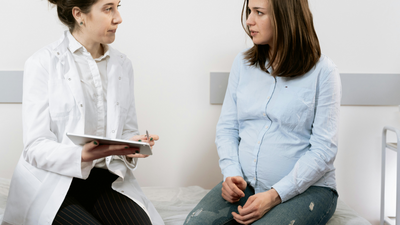12 Ways ChatGPT Can Help or Harm Nursing
12 Ways ChatGPT Can Help or Harm Nursing
By Katie Black
Unless you’ve been living under a rock for the past year, you’ve heard a thing or two about artificial intelligence (AI) being capable of natural word processing (NWP). People are mainly talking about the AI chatbot ChatGPT (chat generative pre-trained transformer) launched by OpenAI, which is able to copy human writing.
In case you’re a little foggy on what exactly ChatGPT is, here's a super simple breakdown.
ChatGPT:
- ChatGPT is a computer program that's designed to have text-based conversations with people. It's a type of AI chatbot that can “understand” what you say or type using machine learning and respond in a human-like way.
- Machine learning is a way computers learn to do tasks without being explicitly programmed. Instead of writing specific instructions for a computer to follow, it’s given a lot of data and then it learns patterns from that data. ChatGPT learned how to have conversations by analyzing a huge amount of text from the internet, learning the rules of language on its own.
As it turns out, ChatGPT and other chatbots could be useful tools for medical practitioners. For example, they could take care of certain paperwork tasks.
The result is nurses and other medical professionals having less on their plates so they can pay better attention to your and your family’s needs. That being said, nurses and other medical professionals need to be aware of the limits and potential risks if they use these technologies.
Let’s take a closer look at this article from The Journal of Clinical Nursing first published in March of this year titled, “Using Chatbots like ChatGPT to Support Nursing Practice.”
Firstly, the article recognizes that ChatGPT is not the first chatbot supporting healthcare professionals. But unlike other chatbots that have their limits, ChatGPT is trained on a range of texts including web pages, books and conversational data so it’s pretty versatile and can be used in a lot of different areas like: customer support, retrieving information, education, and health care.

How ChatGPT Might Help
Some of the ways nurses could use ChatGPT or other chatbots are:
1. Administration: Repetitive writing and admin work like patient info summaries.
2. Care plans: Coming up with care plans that match a patient's needs.
3. Prompting: Communication between nurses and patients with conversation prompts.
4. Jargon-free recommendations: Come up with recommendations that are easy to follow, jargon-free and patient centered.
5. Translation: Translating information to a patient’s native language.
6. Simple care plans: Making complicated medical instructions easy to understand, which could lead to more patients correctly following and sticking to them.

Empathic and informed care/communication is the core of nurse and patient relationships. It’s a very real and scary possibility that relying too much on chatbots can lower nurses’ skills leading to worse care for patients.
Here are six things nurses should be especially aware of (note: this list doesn’t cover everything).
1. Deskilling: By relying too much on these technologies, nurses’ skills and medical knowledge may dull with time. Just like the average person relying too much on Google to recall facts, using ChatGPT too much could cause forgetfulness in nurses.
2. Impersonality: Nurse–patient conversations and interactions can become impersonal and less therapeutic. If consultations and making decisions are automated it can affect how much a patient trusts their health care team.
3. Unreliability: The information chatbots give may not be reliable or evidence based. They can and do come up with incorrect, misleading, or biased information. The information chatbots give is only as reliable as the data it was trained on, and there is always room for errors and misinformation.
4. Confidentiality: ChatGPT itself tells users not to add sensitive, confidential or identifiable information, as it can’t ensure confidentiality. By sharing patients’ confidential information with the technology, nurses could jeopardize their practice both legally and ethically.
5. Security: The information processed by ChatGPT is temporarily kept on OpenAI's servers and is not guaranteed to be secure.
6. Effectiveness: Currently, there isn’t much evidence on chatbots being effective at supporting medical practices (it’s all very new after all). On top of that, ChatGPT not being able to understand the emotional state of patients or rely on experience in making decisions was one of the biggest concerns to the physicians in this study.
Since chatbots can’t be held accountable for their responses, nurses will still ultimately be responsible for the decisions they make in their nursing practice.
Nurses should also be cautious of misleading and exaggerated claims like these technologies being game changers without researching them. Chatbots may help with efficiency, but they are still just a tool and can’t replace the deeply human part of nursing.
Implementation and the bigger picture
Whether nurses are able to use chatbots in their practice depends on several things:
Nurses will need to make sure that chatbots actually improve their practice as opposed to a more traditional way of doing things. The technology should be a good fit ethically, simple to use, testable, and most importantly, able to give tangible results that prove it’s worthwhile.
All in all, chatbots are pretty limited as of right now and have a long way to go before they can safely and effectively support nurses. A lot of people do expect that more AI language generators will be part of daily applications and that could certainly include the medical field.
Interestingly, a few weeks after ChatGPT was released, Google paired with DeepMind to release a medical chatbot “Med-PaLM”. The model is based on medical and research datasets to answer questions and support clinical decision-making. But it’s still too early to tell if these applications can successfully support nursing.
The biggest takeaway from the article is the importance of listening to the input of nurses when decisions are made about medical technologies. Their voices play a crucial role in patients having access to safe and effective care as technology exponentially evolves.






